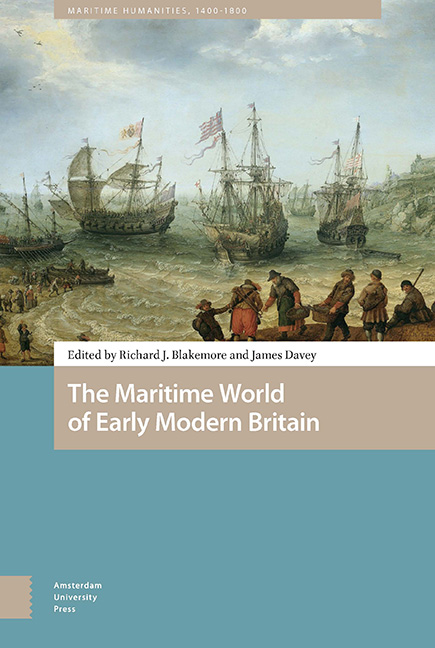Book contents
- Frontmatter
- Contents
- List of illustartions
- Acknowledgements
- Note on Conventions and Terminology
- Introduction
- 1 The Minion and Its Travels: Sailing to Guinea in the Sixteenth Century
- 2 Commanding the World Itself : Sir Walter Ralegh, La Popelinière, and the Huguenot Influence on Early English Sea Power
- 3 An Investigation of the Size and Geographical Distribution of the English, Welsh, and Channel Islands Merchant Fleet: A Case Study of 1571–72
- 4 An Evaluation of Scottish Trade with Iberia during the Anglo-Spanish War, 1585-1604
- 5 Performing ‘Water’ Ralegh : The Cultural Politics of Sea Captains in Late Elizabethan and Jacobean Drama
- 6 ‘Wicked Actions Merit Fearful Judgments’ : Capital Trials aboard the Early East India Company Voyages
- 7 A water bawdy house’: Women and the Navy in the British Civil Wars
- 8 ‘Thy sceptre to a trident change / And straight , unruly seas thou canst command’: Contemporary Representations of King Charles I and the Ship Money Fleets within the Cultural Imagination of Caroline England
- 9 ‘Proud Symbols of the Prospering Rural Seamen’ : Scottish Church Ship Models and the Shipmaster’s Societies of North East Scotland in the Late 17th Century
- 10 Systematizing the Sea : Knowledge, Power and Maritime Sovereignty in Late Seventeenth-Century Science
- Select Bibliography
- About the Contributors
- Index
6 - ‘Wicked Actions Merit Fearful Judgments’ : Capital Trials aboard the Early East India Company Voyages
Published online by Cambridge University Press: 21 November 2020
- Frontmatter
- Contents
- List of illustartions
- Acknowledgements
- Note on Conventions and Terminology
- Introduction
- 1 The Minion and Its Travels: Sailing to Guinea in the Sixteenth Century
- 2 Commanding the World Itself : Sir Walter Ralegh, La Popelinière, and the Huguenot Influence on Early English Sea Power
- 3 An Investigation of the Size and Geographical Distribution of the English, Welsh, and Channel Islands Merchant Fleet: A Case Study of 1571–72
- 4 An Evaluation of Scottish Trade with Iberia during the Anglo-Spanish War, 1585-1604
- 5 Performing ‘Water’ Ralegh : The Cultural Politics of Sea Captains in Late Elizabethan and Jacobean Drama
- 6 ‘Wicked Actions Merit Fearful Judgments’ : Capital Trials aboard the Early East India Company Voyages
- 7 A water bawdy house’: Women and the Navy in the British Civil Wars
- 8 ‘Thy sceptre to a trident change / And straight , unruly seas thou canst command’: Contemporary Representations of King Charles I and the Ship Money Fleets within the Cultural Imagination of Caroline England
- 9 ‘Proud Symbols of the Prospering Rural Seamen’ : Scottish Church Ship Models and the Shipmaster’s Societies of North East Scotland in the Late 17th Century
- 10 Systematizing the Sea : Knowledge, Power and Maritime Sovereignty in Late Seventeenth-Century Science
- Select Bibliography
- About the Contributors
- Index
Summary
For the men on English East India Company vessels in the early seventeenth century, their multi-year voyages were rarely ‘smooth sailing’. Mortality on the first voyage (1601-3), for example, was about 60 per cent. Like most long-distance treks in the early modern period, the accounts of the English East India Company voyages are peppered with examples of shipboard disagreements -both physical and verbal, desertions, disease, and deaths. However, an examination of the ships’ logs from its first 4 major voyages (1601-11) also reveal extreme behaviours such as suicides, sexual deviance, mutinies, and a murder, all of which tested order aboard. These are indicators that for Tudor-Stuart seamen the 2-3 year round trip to the East Indies was one of the most challenging forms of maritime employment. Though the Company was a solicitous employer that was proactive when it came to the physical and spiritual health of its employees, experienced officers, shipboard healthcare, regular worship, good wages, and a diet that often included anti-scorbutics were not sufficient to ensure shipboard harmony on Company ships. For most breaches of discipline, officers chastened offenders with physical punishments, but there were occasions when order was so severely compromised that drastic measures were required. This chapter is not a legal study of these cases, but rather seeks to analyze what these offences and trials reveal about the human costs of the taxing multi-year voyages and the difficulties of maintaining shipboard order. In the voluminous publications about the East India Company, including a current renaissance of works on the Company, little attention has been paid to these topics during its foundational years. This is all the more surprising given how revealing some of these accounts are. This study on shipboard order hopefully adds a needed dimension to this scholarship.
Trying to maintain authority over those the Company deemed ‘the poore vngoverned Marriners’ was a tricky business. Officers were instructed ‘to comaund as you may be both loved and feared, not using aucthoritie to worke your private respect or revenge but […] endevouringe to bringe the longe and tedious voyadge to a profitable end, with care of the saffetie, health and comforte of your people’. In order to do this, officers had to strike a balance between the Company's profits and shipboard paternalism.
- Type
- Chapter
- Information
- Maritime World of Early Modern Britain , pp. 153 - 172Publisher: Amsterdam University PressPrint publication year: 2020



